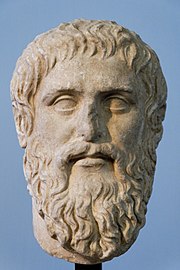
The dialogue Philebus is not one of the best known or oft interpreted in the Platonic canon.
Maybe that's for the best. It would surely cause some confusion for undergraduates, not least because the titular character, "Philebus," has very little to say in it. The discussion is chiefy between Socrates and a student of the sophists named Protarchus. So why isn't it called the Protarchus? I accept my ignorance.
The central issue, at least in terms of narrative structure, is the value of a hedonistic life versus that of a life spent in pursuit of wisdom. Spoiler alert: the conclusion is that the ideal life includes components of both, but that the life spent in pursuit of wisdom at the expense of pleasure gets "second prize."
In the course of this, there are lengthy digressions, as it seems, about cosmology and such. As is often the case with Plato's dialogues, the digressions contain the real philosophical meat.
What is perhaps best remembered about Philebus is the organicist analogy for the cosmos, the notion that the universe is a single body of its own and this one grand body possesses a correspondingly grand soul.
The idea puts me in mind of 21st century cosmology, where a leading idea is that "the universe," by which I mean THIS universe, had a birth and will have a death, and in the meantime it may give rise to other universes.
And THAT in turn puts me in mind of the recent death of Stephen Hawking, and one of his leading ideas: that the singularity at the heart of a Big Bang is mathematically the same fact as the singularity created when a star collapses into a black hole.
For Hawking's idea has offered a distinctive shape to the notion of this universe as one among many. If we think of this universe as a living thing, then it was born from a singularity, it will die in a dispersion into nothingness (called the "heat death" and perfectly the opposite of a singularity) and before it dies it will create other universes -- it will give birth -- by virtue of the process of star collapse.
I think the Plato of Philebus could have wrapped his head around 21st century cosmology.
Comments
Post a Comment